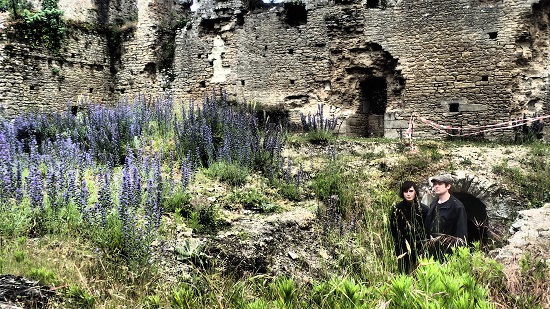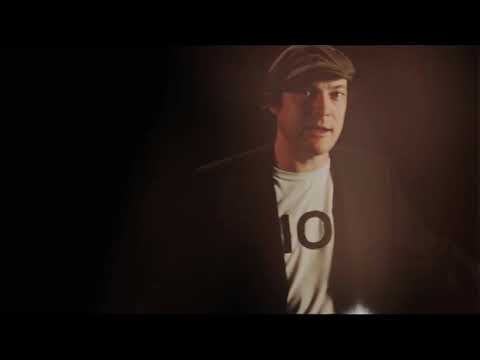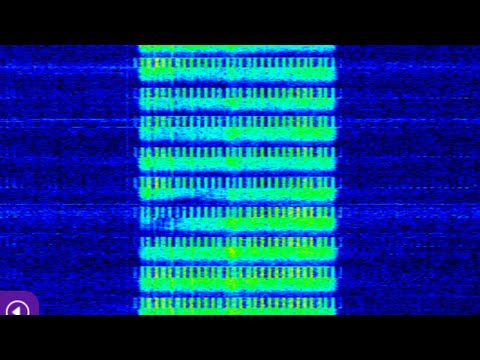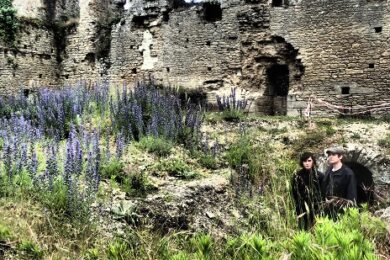The Academy Of Sun, a project led by Brighton-based musician and writer Nick Hudson, is testament to the fact that vast ambition can overcome the significant challenges of DIY musicianship. Their new album The Quiet Earth has an immensity to its scope that comes from Hudson’s vivid, literary songwriting, through which he creates a dark parallel world that teems with emotion and dystopic spectacle. Elevating it, however, there’s a richness and lavishness to the record’s instrumentation, the kind of sweeping melodrama more readily associated with bands of 100 times their profile.
That sense of dark and apocalyptic grandeur is imbued in the record’s eerie drifts of piano, buried-yet-brazen vocals and rushes of ecclesiastical organ and choir, and there on its cover too, where a vintage airship crashes and burns over a ruined modern metropolis, depicted as if by a Victorian oil painter from the vantage point of the last knoll of green left on earth. Hudson’s writing matches it, drawing inspiration from the lasting shadow of the Cold War’s volatility and paranoia. At one point, the band sample UVB-76, the mysterious Russian radio station also known as ‘The Buzzer’ for its broadcast of a constant, repeating buzz for some unknown and potentially sinister purpose. Their last record Codex Novena was almost entirely home-recorded, but for The Quiet Earth Hudson pooled together his resources, took out a loan, withdrew his savings and called in some favours for what he calls “piecemeal” studio sessions, and a limited amount of time in the gorgeous St. Mary’s Church in east Brighton.
The result is a record that feels remarkably accomplished, a satisfying realisation of a bold and aspirational approach to songcraft. To find out more about its creation, tQ caught up with Hudson via email.
tQ: First off, can you take me through a timeline of the new record’s creation?
Nick Hudson, The Academy Of Sun: The songs were written pretty soon after completing Codex Novena, our previous release. Albeit some of the music – the verse refrain from ‘Everything At Once Forever’, for example – was written five years ago. At one point I had amassed around twenty songs so we entered the studio in November 2017 and recorded ‘The House’. Then ‘Polestar’ soon after, and we’d just book sessions as and when I’d summoned the necessary budget to do so. It was a protracted and piecemeal affair, but I wanted the recording experience to be uncompromised – i.e. allowing ourselves to utilise all of the studio facilities to build these songs into the layered, crafted colossi they’ve become. Because we’re wholly independent it took two years to complete, by which time we’d A, recorded five extra songs that will likely see the light of day at some point, and B, discarded a tonne of others at the demo stage. The lyrics took as long to refine and finesse as the music.
Do you view the album in a different light given how much has changed since then, given its dystopian themes?
It was completed in August 2019, and while it’s fair to say I’ve always been preoccupied with the eschatological, I genuinely hadn’t expected to be releasing it under these present conditions! And yeah, somewhat. In retrospect it seems that my take on apocalyptic themes is fairly grand-guignol and melodramatic by comparison – none of us, surely, had expected the eschaton to be so banal, where time has been downgraded to a sludgy, weightless effluvia and where momentum is nigh-on-impossible to either ignite or maintain, due to the pausing of all events. Our slalom has no marker flags so we’re just floundering about in the snow!
How much, if any, funding does the band have?
Ganymede was largely recorded at home, so it was easy to keep the budget down. The Quiet Earth, save for a few vocals and synths, was entirely recorded in a studio (with one tantalizing session inside an enormous church, recording choir, church organ and some lead vocals), so the budget was naturally much higher. However, owing to a very warm relationship with the studio, for which I’m eternally grateful, we were able to enact the process on a piecemeal basis, paying the studio in instalments. The band has no funding beyond what I’ve been able to pull together through my freelance arranging work, savings, loans and concessions such as the piecemeal arrangement.
Tell me more about that enormous church?
It’s St Mary’s Church, Kemptown, East Brighton, I’ve enjoyed a gorgeous relationship with that church for over a decade – I once staged a ten-piece chamber setting of a very early album of mine in there – no PA, no artificial lights – the acoustics are cathedral-like and it’s a vital community hub as well as an exquisite concert space. For The Quiet Earth, engineer Paul Pascoe and I were granted access for a couple of hours – I’d long wanted to hear a pitch-bent church organ – there’s something delightfully perverse about mutating such a monolithic instrument. So we set up a bunch of mics and I played a sustained eight second note on each of the organ bass pedals, and we made a MIDI instrument out of it. You can hear this on ‘Sky Tourism’. I also recorded strings and vocals for a film soundtrack and a solo record there recently, using the natural reverb of the space (which is vast and cavernous). I also, last year, recorded a church organ composition in there for a Derek Jarman super-8 film, which premiered with my new score at the Jarman retrospective in IMMa, Dublin, this spring.
How much do you believe that the environment in which you write and record influences the work you produce?
In terms of how much space and environment influence the result – obviously with a space such as St Mary’s there’s a direct correlative between the space and the resultant sonic. Otherwise, in terms of writing, it’s such an interior and accumulative process that I tend to do a lot of it on the move. I decided to live on my own two years ago and the space to breathe in solitude has proven revelatory in terms of allowing for uninterrupted focus. Any sense of the psychogeographical tends to blossom in the lyrics and the use of field recordings. Like, again, ‘Sky Tourism’ alludes to an afternoon where Storm Ophelia had picked up a tonne of sand from the Sahara and ferried it across the sky into Europe, such that Brighton’s skies darkened under a red shroud of sand at around 2pm. It was mesmerisingly surreal.
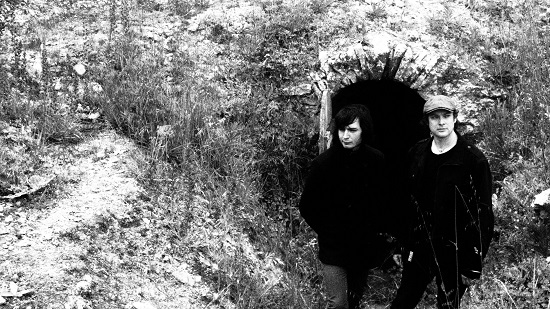
It’s obvious that The Academy Of The Sun are a hugely ambitious project, how do you achieve that ambition when working on a DIY budget?
Patience, persistence, tenacity and a collective problem-solving mentality that seems to be able to make a lot out of very little, haha! Also, perhaps unusually, when making The Quiet Earth, we mixed as we went – bringing each track to a state of satisfactory pre-mixing before going back in to finalise the nuance and detail.
Pre-pandemic, what were the greatest challenges to keeping The Academy Of Sun going over the last decade?
Essentially just being DIY for so long is stressful and demanding – while obviously boasting advantages in terms of creative independence. That plus membership turnover with divergent life narratives etc, all of which is manageable, if bumpy, and to be expected over a decade I guess. I wonder if were we to be situated in mainland Europe things might have been infinitely easier and momentum more hungrily achieved. Certainly when I’ve been touring with Toby Driver (Kayo Dot) on our marathon European tour binges, the appetite of audiences in Central and Eastern Europe has always seemed super-keen. But yeah, mainly just managing the relationship between ambition and budget!
As someone who’s never read it, can you tell me more about Kate Brown’s Plutopia and what influence it holds over you and the record?
Plutopia is a comparative history of both the USSR’s and the US’s first plutonium plants – the plans for the latter being stolen by the USSR to make their own, Ozersk, which is still a closed city, in the southern Urals near Chelyabinsk. It’s a work of rigorous scholarship and deep compassion. Kate Brown is a professor of history at Maryland University. She was raised in the rust belt, and posits in another work of hers, Dispatches From Dystopia, that her childhood amidst the socio-economic ruin of a formerly prosperous industrial landscape likely informs her lifelong preoccupation with contaminated, broken landscapes and the communities that dwell within them.
I was raised in London until the age of eleven, whereupon we moved to deepest rural Lincolnshire. The contrast was stark and severely affected me (not least of which because as an emergent queer person I’d been transplanted from somewhere cosmopolitan and inclusive to somewhere anything but), and over the fifteen years I lived there I saw the towns and villages abandoned by Westminster, reduced to desolate, drug-ravaged ghost farms of pound shops and boarded-up pubs. So in terms of projecting oneself into the worst possible version of what you already know, I felt a kinship with Professor Brown (which I expressed when I wrote to her, early in the process of the record). Also, I was born in 1981 so consider myself a child of The Cold War. I recall Chernobyl happening when I was six and being ambiently aware of the ever-present invisible threat of nuclear annihilation. And I don’t think that’s ever gone away. I’d hazard that those raised with Chernobyl and The Cold War in their living consciousness carry that with them in a way that those born after the fall of the Soviet Union perhaps do not. How these influences are conferred upon the record – the previous album was a litany of deeply personal apocalypses, and with this one, I wanted to turn outwards into the macrocosm. One early premise was that The Quiet Earth would constitute the jukebox at the end of the world.
What was your correspondence with Brown like? Has she heard your music?
It was the briefest of correspondences, initiated by my writing a big, tearful overture upon finishing reading Plutopia. She was super-gracious and said she’d never been contacted about her work by a musician before and that with that in mind she would “keep the letter”. I must send her the finished record…
Can you tell me more about your interest in the former Soviet Union, and how that is manifested on the record?
In addition to the above – being psychically nannied by The Cold War, I think a lot of it is a combination of the exotic and the aesthetic. The USSR and now The Russian Federation embody boundless depths of mystique and intrigue – and that’s the way they seem to prefer it. A highly paranoid (some may say justifiably so) nation. That’s going to appeal to the immensely curious. And the aesthetic – I think Cyrillic is a beautiful script, and the Soviet aesthetic, if one can look past the grimmer regime connotations and view it from a solely aesthetic point of view, boasts powerful creative ingenuity. It’s become something of a trope, but have you seen the book of Soviet bus stops? Because all of the art in the Soviet Union went through a centralised board of heavy censorship, artists’ creative spirit burst through the gaps via civic commissions such as town halls and bus stops. Then there’s the deep, heavy poetry of the great Russian artists we know – Dostoyevsky, Mayakovsky, Tarkovsky and so on. To me, peerless voices.
In The Quiet Earth I kinda take this palette and distil it down to the personal – the idea of contested or volatile territory – all of the former Soviet Republics and their recent history, how borders are not fixed, can be challenged – I explore the nature of identity-territories enacted by two people in a relationship – what aspects of their identity are osmotic, porous and how long do these elements survive, starved of the other entity, etc. Fixity, sovereignty. That’s the DNA. I also just like telling epic stories. Another aspect of my Russian interest is that contemporarily, they’ve pretty much authored the new geopolitical paradigm, and for that alone I think it’s worthy of attention.
You sample ‘The Buzzer’, the mysterious Russian radio station that broadcasts a single intermittent buzzing tone for an unknown purpose. There are lots of theories about that station’s purpose, which of them do you subscribe to?
Credibility aside, my favourite is probably the nuclear dead-hand theory – the idea that this incessant chain of short wave hisses and clicks and numbers will only go silent when the bombs are about to go off. It’s not my preferred choice, of course – I’m romantic rather than fatalistic!

